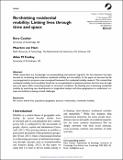Re-thinking residential mobility : linking lives through time and space
Date
01/06/2016Funder
Grant ID
ERC-2013-CoG
ES/K007394/1
ES/K000446/1
Keywords
Metadata
Show full item recordAbstract
While researchers are increasingly re-conceptualizing international migration, far less attention has been devoted to re-thinking short-distance residential mobility and immobility. In this paper we harness the life course approach to propose a new conceptual framework for residential mobility research. We contend that residential mobility and immobility should be re-conceptualized as relational practices that link lives through time and space while connecting people to structural conditions. Re-thinking and re-assessing residential mobility by exploiting new developments in longitudinal analysis will allow geographers to understand, critique and address pressing societal challenges.
Citation
Coulter , R , Van Ham , M & Findlay , A M 2016 , ' Re-thinking residential mobility : linking lives through time and space ' , Progress in Human Geography , vol. 40 , no. 3 , pp. 352-374 . https://doi.org/10.1177/0309132515575417
Publication
Progress in Human Geography
Status
Peer reviewed
ISSN
0309-1325Type
Journal article
Description
Rory Coulter’s work on this paper was partly supported by an Economic and Social Research Council grant [ES/L009498/1]. Maarten van Ham’s contribution was supported by funding from the European Research Council under the European Union’s Seventh Framework Programme (FP/2007–2013) / ERC Grant Agreement n. 615159 (ERC Consolidator Grant DEPRIVEDHOODS, Socio-spatial inequality, deprived neighbourhoods, and neighbourhood effects); and from the Marie Curie programme under the European Union’s Seventh Framework Programme (FP/2007–2013) / Career Integration Grant no. PCIG10-GA-2011-303728 (CIG Grant NBHCHOICE, Neighbourhood choice, neighbourhood sorting, and neighbourhood effects). Allan Findlay’s work was supported by an Economic and Social Research Council grant [ES/K007394/1].Collections
Items in the St Andrews Research Repository are protected by copyright, with all rights reserved, unless otherwise indicated.

